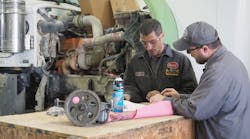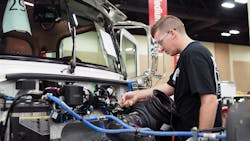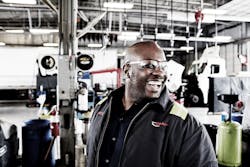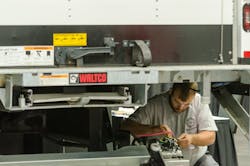Working as a diesel truck technician still has a bit of a stigma attached to it. Much of the general public and upcoming generation of workers view it as a typical blue collar, greasy job, when really, it’s so much more than that.
One of the challenges that the industry has had when it comes to recruiting new blood into the field is publicizing the more recent movement from mechanical diesel engines to electronic diesel engines.
That movement began around the 2008-2010 timeframe when Environmental Protection Agency mandates and other types of government regulations required less diesel emissions from heavy trucks. As that progression took place, a lot of the technology in the truck engine itself changed pretty dramatically, explained Patrick Pendergast, vice president of recruiting at Ryder System Inc.
“What that does for the technician is really create this environment where you have to be continually learning all of the time to make sure that you’re on top of the changes and what’s coming in,” he said. “The work has really shifted from this image of being a very greasy and dirty job. Now it’s got this technology component to it that many folks just don’t know about.”
Though the role of a truck tech has evolved to a more technological, problem-solving career that would appeal to younger generations, the industry continues to struggle to recruit millennials. Just ask Rush Enterprises COO Michael McRoberts—and he’ll confirm it.
“We could probably hire about 500 technicians right now,” McRoberts said during the most recent Rush Tech Skills Rodeo in San Antonio. “I was talking to one of my regional managers in Ohio and asked how many you’d need tomorrow, and he said 50. That’s just Ohio. So there is absolutely a technician shortage, and there’s no supply change in sight on that.”
According to McRoberts, the key to evolving amid a growing technician shortage is developing younger talent and attracting them into the industry to begin with in this tech age. Part of that includes increasing recruiting efforts within local high schools and vocational schools.
Career advancement and development, pay, and training historically have been the biggest challenges in retaining technicians, McRoberts explained. And throughout the industry, keeping technicians past the first year is always hardest.
Overcoming the learning curve
Travis Graham is a technician at Rush Truck Centers in Orlando. At 26 years old, Graham already has two Tech Skills Rodeo competition trophies under his belt, and he has proudly recommended the profession to his friends.
But Graham will be the first to tell you the job is tough and requires tenacity. Furthermore, there’s a big learning curve to overcome.
“Learn as much as you can as quick as you can because the curve is the hardest part to get over,” Graham told Fleet Owner. “Take any advice you can. Most of these guys coming in mentor for a little bit under somebody’s wing. I see the techs who succeed and the ones who don’t. Absorb all the information you can because every little bit helps.”
Every day that Graham is on the shop floor, he’s got a full plate and is balancing his time with work orders, pulling in trucks, diagnosing trucks, writing quotes, and speaking with the service providers, service foremen, and dispatchers. Amid all that, he spends quite a bit of time on the computer, working with diagnostic assistance programs and on new warranty claims procedures that OEMs require technicians to follow.
Graham also explained that a larger part of the job now requires techs to think outside the box and troubleshoot problems that at times aren’t described in OEM protocol.
“The manufacturers are coming out with ways to facilitate themselves toward this new millennial crowd,” Graham noted. “The old generation of technicians is kind of nurturing the rising new techs out there.”
In order to better retain the quality technicians the industry does have, he stressed that shop managers and foremen must have patience with newcomers. “There is such a big learning curve coming into this career,” Graham reiterated. “It’s a big first step, so managers should be patient and work on growing their techs. I think Rush does a great job with that as far as helping get young techs going.”
As for recruiting new technicians into the industry, Graham suggested companies push more career-type days at local high schools and tech schools to give the next generation of workers a taste of what the job is like and what a successful career choice it could be.
Kevin Smith, who is Graham’s service manager for Rush Truck Centers in Orlando, manages 55 technicians among three stores in Orlando. He started his career in 2002 as a diesel technician at
a Ford dealer in Houston for a company that was eventually acquired by Rush, and he has been with Rush ever since.
“I remember first coming onto the floor and the technician was able to make a lot of decisions, especially in regard to making warranty repairs,” Smith explained. “In the past we had a little more flexibility. The technician now has to be super-efficient and has to really almost have to be somewhat of a person who loves to read and loves to be into the books and looking through the workshop manuals.”
When Smith is looking to hire new technicians, it is mostly for Rush’s Peterbilt store, which is also an Isuzu franchise. At that location, he explained, there is a shortage of technicians because Isuzu isn’t partnered with a school, such as the Universal Technical Institute (UTI), the way many of the larger companies are.
“So those technicians are extremely hard to find,” he said. “We have to hire those guys out of a local tech school and then send them to Isuzu for training on our dime.”
On the Ford side, it’s not too difficult to find technicians, since there is a Ford factory school in almost every UTI location now, Smith explained. But it’s much more difficult to find new techs on the heavy truck side.
“We’re not having a hard time finding kids who are trained and went through the program. It’s just that they don’t have the experience around a big truck,” Smith pointed out. “It seems to take those technicians a little bit longer to get up and going where they can actually be on their own.”
The need for diesel truck techs is expected to grow 10% in the next 10 years or so, reports the Bureau of Labor Statistics. According to Ryder’s Pendergast, in order for the industry to keep up with that need, it will require a dedicated effort within the industry.
“I think it requires all of us really taking a good hard look at the places we operate and making sure we are aligning the job and the pay and the benefits to make sure that they’re good quality jobs,” he advised. “It will certainly be a challenge for everyone, but I do think it’s doable. It will require a multipronged approach. It’s not as simple as just going to recruit more technicians because there just won’t be enough.”
Though Pendergast believes the technician shortage challenge is widespread, he explained it can be even more severe in certain parts of the country where the labor pool is even shallower. But in general it’s not just a U.S. problem; it’s global. And that is because of the influx of trucks on the road creating more service-related needs.
“Having both the quantity of technicians you need is one challenge, and then having the technicians who are trained on both the equipment that you’re operating and that you have to work on is another challenge,” he noted. “They’re both contributing to this overall challenge of not enough trained, qualified diesel technicians. If you pair that with pending retirements, with more and more technicians getting closer to retirement age and exiting the industry, you have more exits than you have folks entering the industry.”
Retention efforts
One of Rush’s biggest retention efforts is its mentorship program for new technicians. For the first week or so, new technicians don’t get their own jobs; instead, they work with mentors. Then, after a week or two—sometimes a month depending on the tech—service managers assign the new techs their own tasks, like preventive maintenance intervals, mud flaps, and DOT inspections. Mentors remain in the bay working with the techs and assisting as needed.
“That seems to be the biggest help because most of the guys who get out of tech school don’t have any experience,” Smith explained. “Most times it’s their first job. So the mentors are able to really help them out and keep them going. They don’t feel scared to pull that big truck in the shop and actually do something.”
Another retention tactic that Rush has leveraged among all its shops is its Tech Pro Review System, where new technicians are brought in and reviewed every three months. Level two and three technicians are reviewed every six months or so, while the higher-level techs are reviewed annually. That’s also when managers discuss pay and potential increases.
When Victor Cummings started out his career as a diesel technician, he said he remembers how intimidating the first few months on the floor were, especially since he was a regional tech who had to relocate.
“You don’t know anybody,” said Cummings, who is now the vice president of service operations at Rush. “You’re starting out new, you’re young, and you don’t have those life experiences to know how to navigate through that kind of change.”
“We would gather the new hires together and we would start out with a very informal weekly meeting: ‘How are you doing? What are you thinking? Are you getting what you need? Do you have any questions or concerns?’” Cummings continued. “That’s really how our mentoring program as it is defined today evolved and was developed—through a collaboration of management, our employees, and most importantly, the new hires.”
Before that mentorship program, technician turnover was about 37.5% to 38%, Cummings noted. Now, he said, turnover is well below the industry standard, which is around 32%. He emphasized that the company-wide goal is to reduce turnover into the mid-20s over the course of the next few years.
“There is no silver bullet,” he said. “I would say first and foremost is embracing the technicians, welcoming them, and providing them with the communication, support, guidance, and feedback they need. Without that, nothing else happens.”
In addition to that, millennials coming into the workforce today want to understand that they have future career options and upward mobility within a company. So companies like Ryder and Rush are trying to publicize that aspect of the job to attract younger folks to the profession itself. For many companies, it’s happening at almost the high-school level to get new workers interested in the field.
Pendergast stressed the importance of showing new recruits that their careers don’t necessarily have to start and end as a diesel technician.
“It’s where you might start, but then you can progress your career and take it into a number of different ways—into leadership and other parts of our operations, like human resources or safety,” he said. “There are a whole bunch of different jobs you can do after spending time as a technician and learning about the business firsthand.”
In order to appeal to younger generations of workers, Ryder partners with Automotive Service Excellence (ASE), the accrediting body for both high school and post-secondary diesel technology training. With that partnership, Ryder not only trains ASE instructors, but it also provides insight as to what actually happens inside the shop and out in the field.
Ryder also has used its partnership with the military as a resource by introducing transitioning service members into its diesel technician program. Through its training program, a transitioning service member gets 12 weeks of training and a guaranteed opportunity to interview and find a position with Ryder at the conclusion of that training.
Once a veteran is hired at Ryder, he or she goes through the company’s Veteran Buddy Program, which links newcomers with a Ryder employee who is also a veteran. While these men and women are transitioning to a new job and civilian life, they have a mentor who can walk them through the onboarding and transitioning processes at the company.
Ryder is also focused on attracting more women into some of these technician roles and into the industry as a whole.
“We’re severely underrepresented from a female standpoint,” Pendergast stressed. “That’s really through our work with the Women In Trucking Association and getting the word out to women that we have terrific opportunities, whether it be as a technician or as a driver, dispatcher, manager, or leadership.”
Ryder holds an annual Top Tech event in which technicians throughout the company compete to see who is the company’s number one technician in the field. That event, which is similar to the Rush Tech Skills Rodeo, allows technicians to gain recognition in their peer group and compete for money and other perks. The competitions have become solid retention efforts for both companies.
“I think the one thing that seems to be true across the board is that technicians love to up their skill set—and they love to learn,” Pendergast noted. “We really work hard to make sure those technicians hired into our company have an opportunity to continue to learn more and build their skills.”







